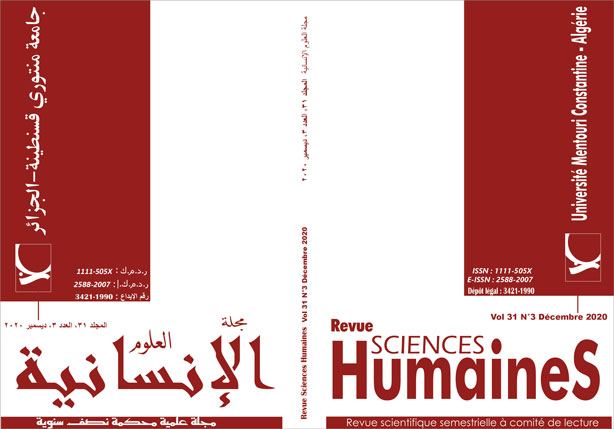Learning to Write and Writing to Write: Composition Instruction from Habit Formation to Cognition
Keywords:
writing, approaches, methods, product, processAbstract
Over the last fifty years or thereabouts, there has been an upsurge in SL/FL rhetoric studies that have given rise to a panoply of theories and approaches that have contributed and still contribute to a better teaching and learning of writing. This paper aims at offering a an account of the ingenious methods to teach writing. In actual fact, such theoretical frameworks draw heavily upon the various learning processes which were put forward all along the twentieth century, viz. behaviorism (habit formation) and cognitivism (cognitive science). What truly characterized the evolution of such spectrum is the shift from focusing on the final product to focusing on the composing processes. Indeed, the shift was from a focus on syntactic maturity and grammatical accuracy at the sentence level, to a focus on the different rhetorical functions at the discourse level.
Downloads
References
. Badger, R., & White, G. (2000). A process genre approach to teaching writing. ELT Journal, Volume 54/2 , 153-160.
. Belbase, M. R. (2012, January 1). The Process-genre Approach: Some ideas for teaching writing in Nepal. Retrieved from https://neltachoutari.wordpress.com/2012/01/01/the-process-genre-approach-some-ideas-for-teaching-writing-in-nepal/
. Bereiter, C. & Scardamalia, M. (1987). The Psychology of written Composition. Hillsdale, N.J: Lawrence Erlbaum Associates.
. Bruce, I. (2008). Academic Writing and Genre. London: Continuum.
. Caroll, J. A., & Wilson, E. E. (1993). Acts of Teaching: How to Teach Writing. Colorado: TEACHER IDEAS PRESS.
. Cho, Y. (2008). Assessing Writing; Are We Bound by Only One Method? Assessing Writing , 165-191.
. Clark, I. L. (2005). Concepts in Composition. New Jersey: Lawrence Erlbaum Associates, Inc.
. Elbow, P. (1981). Writing with Power. New York: Oxford University Press, Inc.
. Flower, L., & Hayes, J. R. (1981). A Cognitive Process Theory Of Writing. College Composition and Communication, Vol. 32, No. 4 , 365-387.
. Freedman, A. (1999). Beyond the Text: Towards Understanding the teaching and Learning of Genres. TESOL Quarterly, Vol. 33, No. 4 , 764-767.
. Harmer, J. (2004). How to Teach Writing . Harlow: Longman.
. Hinkel, E. (2004). Teaching Academic ESL Writing. New Jersey: Lawrence Erlbaum Associates, Inc. .
. Hyland, K. (2011). Learning to Write. Dans R. M. Manchon, Learning to Write and Writing to Learn in an Additional Language (pp. 17-35). Amsterdam: John Benjamins Publishing Company.
. Hyland, K. (2003). Second Language Writing . Cambridge University Press.
. Kellogg, R. T. (1994). The Psychology of Writing. Oxford: Oxford University Press.
. Nunan, D. (1989). Designing Tasks for the Communicative Classroom. Cambridge Univesity Press.
. Raimes, A. (1983). Techniques in Teaching Writing. New York: Oxford University Press.
. Silva, T. (1990). Second Language Composition: development, issues, and directions in ESL. Dans B. Kroll, Second Language Writing (pp. 11-23). Cambridge: Cambridge University Press.
. Silva, T. (1993). Towards an Understanding of the Distinct Nature of L2 Writing: The ESL Resaerch and Its Implications. TESOL Quarterley , 657-677.
. Weigle, S. C. (2002). Assessing Writing. Cambridge: Cambridge University Press.
. White, R. V. (1988). Academic Writing: Process and Product. Dans P. C. Robinson, Academic Writing: Process and Product (pp. 4-16). Hong Kong: Modern English Publications in association with The British Council.
. Williams, J. D. (2003). Preparing to Teach Writing. New Jersey: Lawrence Erlbaum Associates, Inc.
Downloads
Published
How to Cite
Issue
Section
License

This work is licensed under a Creative Commons Attribution-NonCommercial-ShareAlike 4.0 International License.
















